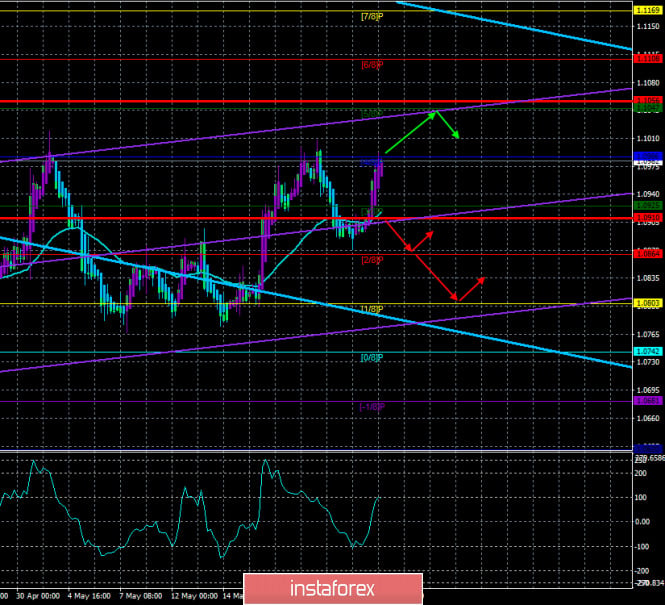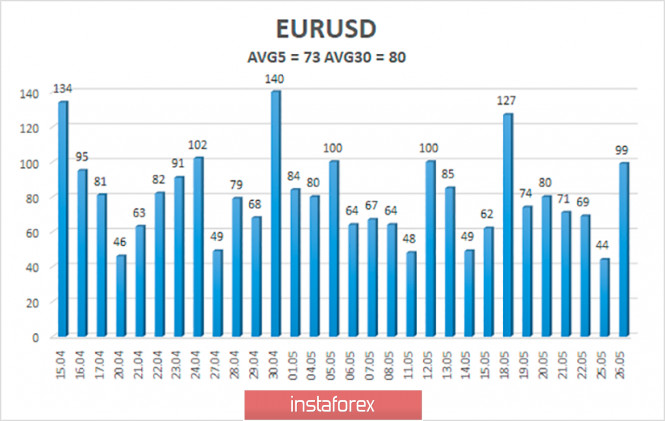4-hour timeframe

Technical details:
Higher linear regression channel: direction - downward.
Lower linear regression channel: direction - upward.
Moving average (20; smoothed) - upward.
CCI: 104.6616
The EUR/USD currency pair spent the second trading day of the week in a strong upward movement and returned to the upper border of the side channel of 1.0750-1.1000. At the same time, it is quite difficult to find any good and unambiguous reasons for such a strengthening of the euro currency. No macroeconomic statistics were published yesterday, and there were no speeches by top officials of the European Union or the United States. Thus, the pair's quotes just returned to the Murray level of "4/8"-1.0986 and now can rebound again from it or from the level of 1.1000, starting a new round of downward movement to the lower border of the channel of 1.0750. Since the euro/dollar pair remains within this channel, we believe that the most likely development of events will be a new decline. However, do not forget that you cannot be 100% sure of anything in the Forex market. You always need to be safe and have a backup plan. If traders confidently overcome the area of 1.0986-1.1008, this may trigger the formation of a new upward trend. There is little fundamental support for the euro currency at the moment, but the same can be said for the US dollar. Thus, the foundation and macroeconomics are not a hindrance to the growth of the euro currency.
Not so long ago, we wrote that France and Germany, in the faces of Angela Merkel and Emmanuel Macron, seems to propose a plan that will help the Eurozone to overcome the crisis caused by the pandemic. However, almost immediately it became clear that not all EU countries support such a scenario, and it seems that no one asked the smallest countries if they supported the German-French proposal. Anyway, after the idea with the "coronabonds" failed, and the European Council failed to agree on the sources of funding for the 2-trillion program of assistance to the European economy, the sacramental question arose: "What should we do?" If the European economy does not continue to pour money, the decline may continue at the same pace, and the recovery will be delayed for many years. It would seem that the solution to this issue would be the proposal to create a 500-billion recovery fund, which will be financed by the EU countries themselves, after which these funds will be divided among the most affected countries and sectors of the economy in the form of grants. However, it is not difficult to guess that Germany, which initially did not want to help the southern countries, accusing them of excessive spending and not being able to save money, would hardly have proposed such a plan, which implies the loss of serious financial resources. Germany itself coped with the "coronavirus" pandemic with relatively small losses, human and financial. Well, France, which has suffered from the "coronavirus" very much along with Italy and Spain, requires itself a serious cash injection from the European government. Thus, according to the plan of Merkel and Macron, the funds will be collected according to the size of the economies of each member country of the Alliance and divided among the most affected industries. It is easy to guess that the countries with the largest economies have suffered the most (with the exception of the "Northern" countries). Thus, in simple terms, the poorest EU countries will have to pay for the restoration of the most important and significant sectors of the economies of the countries most affected by the epidemic, that is, large and rich countries. This is the conclusion reached by the Center for European Economic Research. France, Spain, Greece, Portugal, and Italy can receive the most money from the fund, and they will not need to be returned. Spain and Italy have already announced that they will receive funds only on a free basis. And Austria, the Netherlands, Finland, and some other countries generally opposed the "Merkel-Macron plan". So, first of all, it is not obvious that anything will come out of this proposal at all, and secondly, discussions of this proposal among representatives of all countries have not even begun yet. Accordingly, the fate of the next ambiguous package of assistance to the European economy will be decided only in June, and a decision on it may not be made until July.
While the European currency unexpectedly jumped up, the fundamental background for the euro/dollar pair remains essentially neutral. Yes, there are a huge number of important topics that can have a huge impact on the world economy, on the American and European economies. However, these are "long-term" topics that can have a negative impact on a particular currency, approximately like Brexit on the pound, that is, for many years. For example, if the EU countries fail to come to a common denominator in terms of saving the economy, the recovery will be much longer, which will negatively affect the euro, unless a similar picture is observed in the United States. And overseas are preparing to "cold war" with China, although many experts believe that Washington now has no resources to impose sanctions and duties against Beijing, will not be able to resist the retaliatory measures of the Celestial Empire, and therefore bluff openly, declaring its readiness to introduce a huge list various restriction. Experts believe that the "coronavirus" has crippled the US economy, which will recover hard and long without a new confrontation with China. Moreover, the question is open with Donald Trump and his further tenure as US President. After all, in January 2021, he can leave his post, and the new president can adhere to a completely different foreign policy. For example, Joe Biden is on friendly terms with China and will certainly try to establish relations with it.
ECB President Christine Lagarde and Vice-President Luis de Guindos are scheduled to speak in the European Union on Wednesday, May 27. We do not believe that their statements can surprise the markets in any way, although everything will depend on what the two economists say. Christine Lagarde can just touch on the topic of stimulating the European economy, the "Merkel-Macron plan", and once again call on the European Commission to help businesses and employees. No important macroeconomic publications are planned for this day, either in the European Union or the United States.

The average volatility of the euro/dollar currency pair as of May 27 is 73 points. Thus, the value of the indicator is characterized at this time as "average". Today, we expect the pair to move between the levels of 1.0910 and 1.1056. The reversal of the Heiken Ashi indicator downwards signals a very likely resumption of the downward movement to the lower border of the side channel of 1.0750-1.1000.
Nearest support levels:
S1 – 1.0925
S2 – 1.0864
S3 – 1.0803
Nearest resistance levels:
R1 – 1.0986
R2 – 1.1047
R3 – 1.1108
Trading recommendations:
The EUR/USD pair made another round of upward movement within the side channel and again stopped near its upper border. Formally, buy orders are currently relevant since the price is located above the moving average. However, we do not recommend opening buy positions until the area of 1.0986-1.1008 is successfully overcome. It is recommended to return to selling the pair if the price reverts below the moving average line with the goals of 1.0864 and 1.0803.
The material has been provided by InstaForex Company - www.instaforex.com